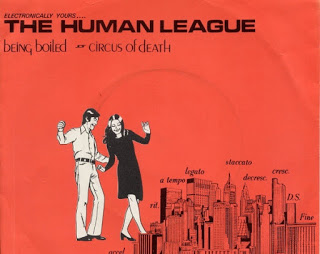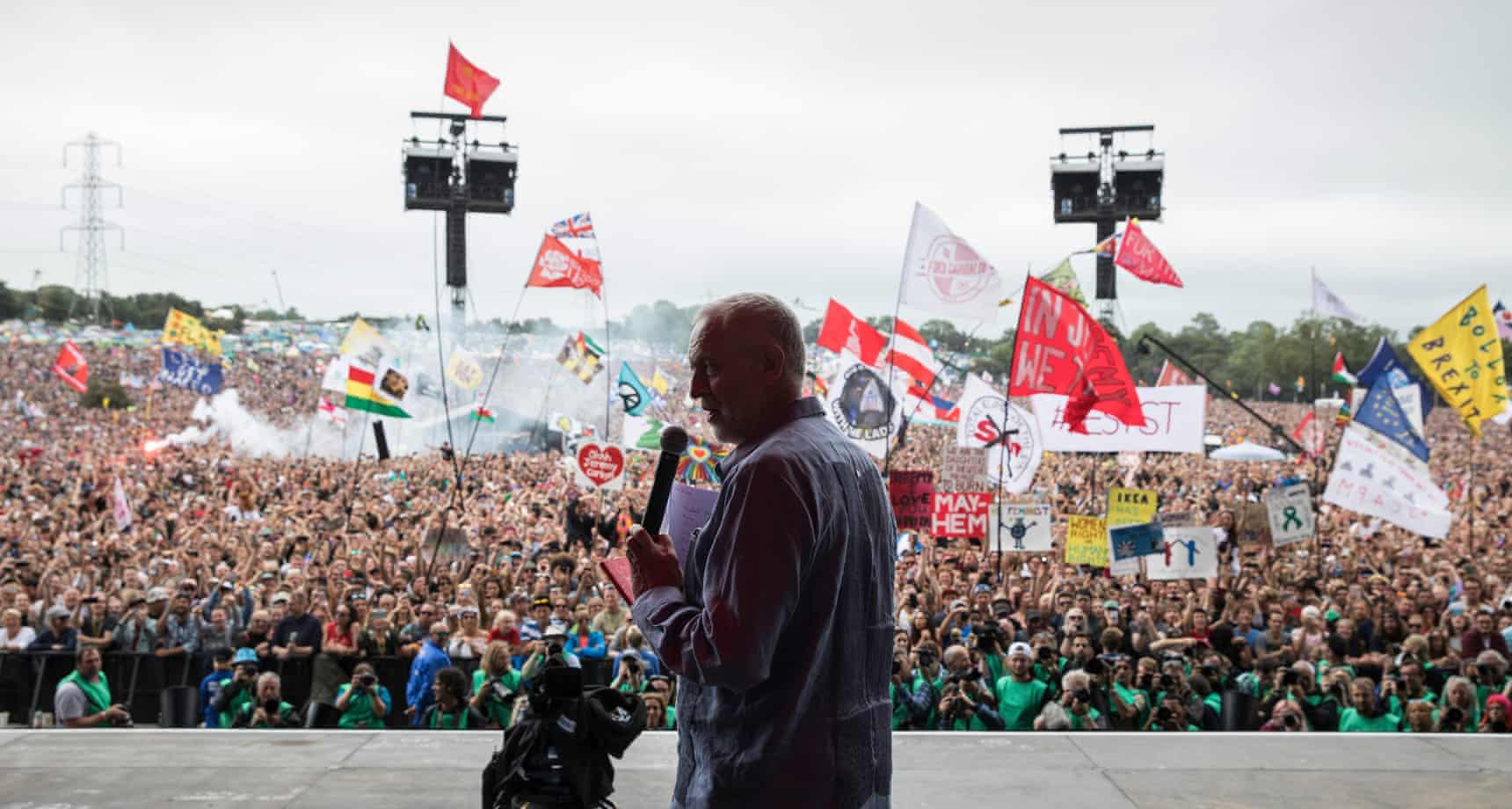21 Mar 2020
For a Pop Communism: Notes on the Labour Leadership Contest

What is Pop? Or equivalently, what is the popular? This is the question Simon Reynold’s book Rip It Up and Start Again forces us to confront, particularly towards the middle of the book, where the focus pivots from post-punk to early 80s New Pop: the moment many post-punk artists such as Scritti Politti and The Human League get tired of post-punk’s puritanical commitment to fringe experimentalism and turn their sights to the mainstream, the popular. What’s valuable about Reynolds account here is that it gives us the perspective of approaching Pop from the outside: we are introduced to a rag-tag clan of artistic misfits who are desperately trying to crack the code of the popular, to break into the Top 40 and become stars, as if it were some alien language beamed in from another galaxy. It is these people, those who consciously have to crack and break into it, who really understand Pop, rather than those who have unconsciously been interpellated or conditioned by it (such as the “popular” kids at school).
This is because the popular – Pop – has very little to do with what “is” popular, statistically and numerically. Pop is not simply a kind of molar statistical aggregate, a name for a thing lots of people know of or do. Commuting to work – to conjure up the most banal example I can – is something millions of people do, but one would really be stretching to call commuting “popular”, or “Pop”. It’s part of the grey background of everyday life: precisely the thing that Pop strives to stand out against and rupture. Pop needs to be a spectacle, a concentrated singularity, quite literally the centre of attention, in order to exist. Pop is a centralisation or it is nothing.
Of course, numbers matter. You can’t attach the concept of Pop to something that literally zero people have heard of. Pop clearly has a direct relation to, and orientation towards, what is statistically and numerically eminent. Indeed, it needs this eminence, this large numerical infrastructure, to effect the rupture it desires, because the rupture is in this infrastructure.
This is why so many attempts to be popular by unimaginatively mimicking what is already “popular” come off as desperate, and concomitantly fail. Desperate attempts to be “popular” misunderstand the verticality and hierarchy of Pop, the form of the popular. The desperate take Pop to basically be a statistical quantity above a certain numerical threshold, and thereby desperately appeal to those that are already “popular”, already above the threshold, to give them a leg up – as if Pop were some exclusive member’s club, that only let people in if they dressed and spoke according to fixed, established protocols. There is an implicit and unquestioned faith in this quantitative view of Pop in an underlying, continuous and coherent substance that necessarily forms the foundation for any quantification of popularity, for any quantity is a quantity of something, a stable quality or essence.
This fails because desperation isn’t contagious; it is an affect that cannot reproduce itself because it depends entirely on an external being, the superior Master, to whom it appeals from a distance. Desperation does not directly cause more desperation; instead, to become desperate, one must always make that indirect detour through the superior Master. Contagion by contrast requires a kind of horizontal similarity (not the vertical hierarchy and difference indexed by desperation) – that common substance or molar aggregate noted above, a common code or genetic makeup – that is parasitically fed on and infected (more on this below). There’s a reason the contemporary parlance for Pop is “going viral”.
In short, Pop’s verticality is a verticality-in-horizontality: a concentration, an increase in density or pressure. The superiority and centralisation of authority of Pop does not occur through a distancing from the hoi polloi, the common masses, but in and through it. Pop takes the “common”, that consistent shared substance, and rather than taking it for granted (as in the quantitative view of Pop above), ruptures it, cuts it apart, breaks apart the common logic of sense and ultimately reorganises it. It takes particular points in the “common” and intensifies them, puts pressure on them, until they break apart and are reorganised. For example, viruses such as Covid-19, perhaps the biggest Pop phenomenon of the past decade, work by breaking into a cell and inserting their genetic code into it, thereby instructing the host cell to reproduce more of the virus. It takes that common genetic code shared by all the host cells it infects and shamelessly cuts into and reorganises it, throwing the host cells and their related organism into crisis, demanding a heightened response from the immune system1. Thus, while the virus takes on a position of superiority or power, literally overcoming us, this superiority only occurs in and through – not at a distance from – a horizontal commonality and consistency, a shared code, genetic sequence or substance.
(One needn’t delve into microbiology to make this observation either: just read k-punk’s posts on Glam to see how this Pop mechanism works in the realm of music.)
Consequently, Pop isn’t, or shouldn’t be, about catering to or representing “the common” as some fixed substance: the result of this approach has been the vast majority of uninspired, retro-derivative music that is labelled “Pop” today. Instead, as charted above, we should dare to conceive of Pop as a concentration of pressure, a rupture, in “common sense”; or, as k-punk saw it, a nihilation that is the basis of all the best Pop:
What Pop lacks now is the capacity for nihilation, for producing new potentials through the negation of what already exists. One example, of many possible. Both the Birthday Party and New Pop nihilated one another: far from existing in a relation of mutual acceptance or of mutual ignorance each defined themselves in large part by not being the other. One shouldn’t rush to conceive of this in simple-minded dialectical terms as thesis-antithesis, since the relationships are not only oppositional – there is always more than one way to nihilate, and it is always possible for any individual thing to nihilate more than one Other. It seems at least plausible to suggest that the capacity for renewed nihilation is what has driven Pop.
He concludes:
So let’s dare to conceive of Pop not as an archipelago of neighbouring but unconflicting options, not as a sequence of happy hybridities or pallid incommensurabilities, but as a spiral of nihilating vortices.
The statement is loud and clear: Pop opposes and nihilates what is “popular” or “common”. Postmodern consumerist PR, on the contrast, caters to and mollycoddles it.

*
All this discussion of Pop and the popular is, of course, directly related to politics. In particular, it sheds light on the miserable state of affairs that is the current Labour leadership contest.
Each of the contenders, Keir Starmer, Lisa Nandy, and Rebecca Long-Bailey, have sought to either distance themselves from or outright tarnish the legacy of outgoing leader Jeremy Corbyn, inflecting this distancing in their own terrible way. Starmer’s appeal is essentially that of politics as usual, another white professional man in a suit and thereby “electable”; Nandy’s campaign has basically been that Labour know nothing and should pander to the racist, nationalist, petty conservatism so many of us found on the doorstep in December; and Long-Bailey, the supposed left candidate, has been supremely lacklustre, making some promising policy announcements while at the same time desperately trying to make herself appear as “normal” as possible, contra Corbyn’s quasi-hippy eccentricities. (For example, take this interview where she stresses that her favourite leisure activity is having a Chinese takeaway and watching Netflix – which stands in stark contrast to Corbyn’s pastimes of tending his allotment, collecting manhole covers, and reading Ulysses while interrailing across Europe.)
Interestingly, the common enemy for all the candidates is precisely the thing that was so appealing and exciting about Corbyn: not so much a set of policies, but quite fundamentally the fact that he embodied a countercultural way of life. In their different ways, Starmer, Nandy and Long-Bailey’s pitches say the same thing: let’s keep (most of) the policies, but make it look different, more normal, more palatable. On the surface, this looks like a perfectly harmless and agreeable measure (it’s win-win: socialism, but “marketable” and without “baggage”), but with any sustained analysis it reveals itself to be a profoundly problematic argument – philosophically, politically, and practically. And it has everything to do with a misunderstanding of Pop, of the popular.
Starmer, Nandy and Long-Bailey will all point at policies like renationalisation and increased public spending and note their general “popularity” with British voters and the fact that they did not lose us the election. There is an element of truth here: policies like renationalisation are widely accepted. But – and this is the key point – their mode of acceptance is basically passive. Voters are probed by polling companies on these questions and essentially shrug and go “yeah, that sounds alright”. What becomes revealed through these polls, then, is not so much an articulated desire for socialism but a kind of mapping of the collective unconscious, a common set of auto-responses or servomechanisms. Consequently, while the policies possess a certain numerical eminence and passive consent, they lack the backing of any widespread and active drive or movement to achieve them. They’re “popular” or “common”, but not Pop.
For the three leadership contenders, this isn’t a problem, because they’re fully signed up to the reductive quantitative view of Pop. “Common sense” is worshipped and becomes the common, underlying, unconscious substance upon which we can quantify and measure “popularity”. Breaking with this “common sense” – as Corbyn did with his beige suits and eccentric past – breaks down this entire quantification and supposed accumulation of “popularity”, thereby threatening the party with “unelectability”. Faced with this self-imposed constriction, the only option left is the putrid strategy of constantly invoking and appealing to “common sense” socialism, typified by the depressing equation of: more common sense = more popularity = more electability = more power. (A strategy which, as the electoral results for many social democratic parties across the world demonstrate loud and clear, has a terrible track record in the current global climate.)
The result of this approach, of course, is boredom. Every single contender is a bore from head to toe: Starmer, steeped in white middle class professionalism and all its weak as shit banter; Nandy, happy to entertain your boring, racist relatives at Christmas; and Long-Bailey with her exaltation of mindless Netflix vegetation. This has everything to do with their former professions, all upper-middle class white collar: Starmer was obviously a senior lawyer and the former Director of Public Prosecutions; Nandy worked for an MP and then worked as a researcher for some NGOs/charities; and Long-Bailey was a solicitor whose husband is a marketing director. In every case, we have a catering to dominant and “common sense” bourgeois notions of “respectability” and how to live one’s life (go to uni, graduate and get on a grad scheme, become a manager, work your way up until you die…), and a complete desertion of any countercultural way of life, any embodiment or practice of a Pop-style nihilation.
“Popularity” is inherently boring, rousing no active desire but instead a pathetic and desperate appeal to be accepted. The very existence of “popularity” depends on an external stock of “common sense” or common protocols/trends that it must cater to as its foundation/base. “Popularity” has no mind of its own, it is entirely dependent and uncritical, constitutively conservative and reactionary. (Just think about how boring all the popular kids from school have turned out to be.) Pop, by contrast, nihilates the boring: it traces an active, nihilating movement across forms, always jumping from one to the other as one becomes boring and predictable and another emerges in an antagonistic reaction to it.
*
My argument here, though, isn’t just moaning that the three contenders are bad just because they’re boring. It’s instead something a bit more nuanced: socialist or communist politics literally cannot afford to be boring, because being boring and fetishizing “popularity” by definition express a dependence on and adherence to “common sense” or any of the other large molar aggregates that make up the world, which are precisely what communism is about breaking down. The moment socialism or communism becomes “common sense”, as many have been declaring reflecting on the Tory government’s reaction to the coronavirus crisis, is precisely the moment we know things are going wrong, or immediately need to change tack. It’s the moment for another Pop-style nihilation and antagonism. (This, indeed, is precisely what Marx and Engels make clear in The Communist Manifesto when they declare that communists “everywhere support every revolutionary movement against the existing social and political order of things”.)
This is all about the relation between the content and expression of communism: what form of expression is demanded by the form of content of communism. And this form of expression is, precisely, Pop2: communism as a series of nihilating vortices against the existing popular social and political order of things. Communism needs Pop. It needs that magnetic, captivating allure that all the best Pop stars have commanded.
Jeremy Corbyn is an apt (and in light of the events since December, tragic) example here: a soon-to-be-lost symbol of a fleeting moment when the British left was Pop.
Initially, at least, Corbyn was a leader who understood that socialist or communist principles necessitate not just a particular way of thinking and speaking but also a totally different way of living. In this sense, Corbyn embodied the promise of Pop: rather than living the usual life of a politician, faithfully following the Oxbridge-to-Parliament pipeline, he came to the Labour leadership race in 2015 with roughly 40 years of community organising, union activism and anti-imperialist solidarity under his belt. The “common” programme for being a politician or Leader of the Opposition was scrambled in every sense, in a Pop-style nihilation. Huge sequences of the code were deleted (the polished Oxbridge attire; the PR soundbites; the narrow nationalistic viewpoint and pandering to anti-immigration sentiments) and new sequences were inserted (a commitment to the grassroots; anti-austerity; genuine interest in literature and culture). Corbyn sceptics in Labour, usually on the liberal or soft left, frequently derided this scruffy scrambling of the accepted codes of politics as frustrating “baggage”, particularly in regards to his anti-imperialist solidarity work. But this “baggage” was precisely what made Corbyn a quasi “pop star”, a genuine cultural icon, that was at the centre of the 2017 almost-victory. It’s hard, for instance, to imagine something like Grime4Corbyn happening without Corbyn’s history in (or “baggage” of) anti-racist and anti-imperialist organising, as grime artist Akala’s support for him demonstrated. It was the “baggage” that made Corbyn Pop.
*
But for all this exaltation of Pop, content still – clearly and necessarily – matters. Pop is ultimately a kind of ambivalent form that can feed upon a whole range of common codes, substances, and molar aggregates. A Pop Communism3 still, therefore, depends on that set of common principles, theory and policies that all leftists are at least somewhat familiar with and advocate for. But the point nonetheless remains that good policies aren’t enough, and never will be enough. In honesty, I couldn’t care less that all of the leadership contenders are standing on a platform that has substantial bits of “Corbynism” in them. Instead I want a leadership candidate that will stand in front of everyone and say the unthinkable: that everything that was ostensibly bad about Corbyn, all his “baggage” that even the left took turns in complaining about, was precisely the most valuable thing about him. The beige suits, the history on the backbenches, the anti-imperialist solidarity, the eccentric anecdotes and hobbies, that’s what we wanted, and what we still want. It was what made Corbyn, and Labour, ever so briefly Pop, reaching its crescendo in the aftermath of the 2017 election.
2017 Corbyn “won”, for all intents and purposes. 2019 Corbyn lost.
We collectively gave up Pop and settled for “popularity” and “common sense”.
We can’t make the same mistake again.
-
I am not trained in biology, so this is massively generalised, and I welcome insights from virologists and epidemiologists on this matter. ↩
-
Pop, then, is a particular form of expression (as opposed to a form of content – this is why Pop music covers so many different genres and can hardly be labelled a genre in itself) ↩
-
As I think about it, I think Pop Communism is basically the same as Acid Communism. Or at least very similar. So this neologism may be completely redundant. ↩
